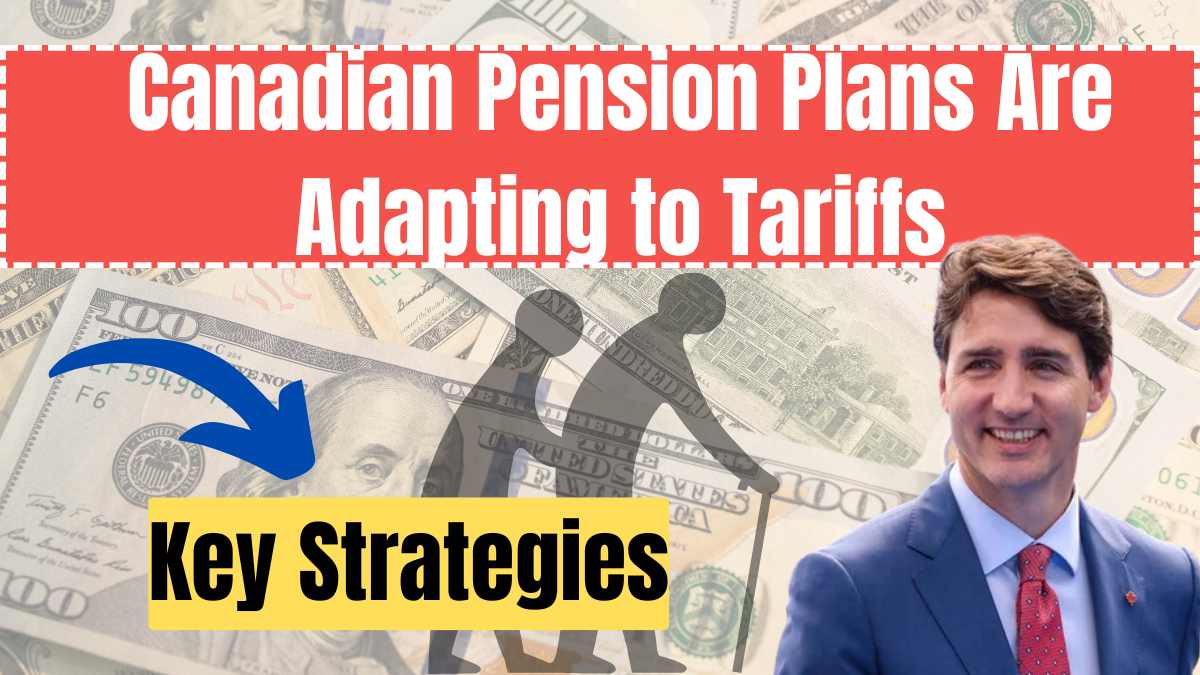With new trade tariffs affecting global markets, Canadian pension funds and institutional investors are adjusting their strategies to protect assets, maintain growth, and minimize risks. These tariffs, imposed on key industries such as manufacturing, technology, and energy, have created economic volatility, raising concerns about investment returns and market stability.
Despite these challenges, major pension funds and financial institutions in Canada are adopting innovative strategies to safeguard investments and sustain long-term profitability.

How Canadian Pension Plans Are Adapting to Tariffs
| Pension Fund | Strategy to Mitigate Tariff Impact |
|---|---|
| Canada Pension Plan (CPP) | Expanding global investments to reduce reliance on U.S. trade. |
| Ontario Teachers’ Pension Plan (OTPP) | Increasing real estate and infrastructure investments. |
| Caisse de dépôt et placement du Québec (CDPQ) | Supporting local businesses to strengthen the domestic economy. |
| OPTrust | Adopting a risk-managed investment approach to stabilize returns. |
Key Strategies Adopted by Institutional Investors
1. Diversifying Investment Portfolios
To counter the risks associated with tariff-driven economic slowdowns, pension funds are shifting their focus from traditional industries to diversified global assets.
- Investing in Emerging Markets: Canadian pension funds are expanding investments in Asia, Europe, and Latin America to reduce dependence on U.S. trade policies.
- Infrastructure & Real Estate: Funds like OTPP and CDPQ are prioritizing infrastructure, renewable energy, and commercial real estate for stable long-term returns.
- Technology & Innovation: Many pension funds are allocating resources to AI, automation, and digital transformation, which are less impacted by tariffs.
2. Strengthening Domestic Investments
Some pension funds are investing more in Canadian businesses to reduce exposure to international trade uncertainties.
- CDPQ has launched a $1 billion fund to help local companies expand operations.
- CPP is focusing on domestic energy and resource projects to create long-term economic stability.
- Ontario Teachers’ Pension Plan is financing sustainable infrastructure projects in Canada to drive domestic economic growth.
3. Adapting to Changing Interest Rates
- If tariffs slow global trade, interest rates may be adjusted to counter economic slowdowns.
- Pension funds are hedging against inflation and potential rate cuts by investing in fixed-income securities, bonds, and inflation-protected assets.
How Trade Tariffs Are Affecting Market Sectors
The introduction of tariffs on key exports has created instability in multiple industries, forcing investors to reassess their strategies.
| Industry | Impact of Tariffs | Investment Strategy |
|---|---|---|
| Manufacturing | Higher costs for raw materials and exports. | Investing in automation and local production. |
| Technology | Limited access to global supply chains. | Investing in AI and software-based businesses. |
| Energy & Resources | Reduced exports due to trade restrictions. | Expanding renewable energy investments. |
| Retail & Consumer Goods | Rising import prices lead to inflation. | Investing in companies with strong domestic supply chains. |
Challenges and Risks for Canadian Pension Funds
1. Market Volatility
- Trade wars and tariff disputes create stock market fluctuations, affecting pension fund returns.
- Pension funds must maintain liquidity to manage short-term losses.
2. Inflationary Pressures
- Tariffs increase the cost of imports, driving up inflation.
- Higher inflation reduces purchasing power for retirees, prompting pension funds to adjust payout structures.
3. Global Trade Uncertainty
- Long-term trade policy changes could disrupt investment planning.
- Pension funds are focusing on flexible asset allocation to navigate unpredictable market conditions.
Future Outlook: How Pension Plans Can Stay Resilient
To thrive despite tariffs and trade barriers, Canadian pension plans must:
- Expand global investment footprints while balancing domestic economic priorities.
- Strengthen partnerships with local businesses to reduce reliance on international supply chains.
- Adopt AI-driven market analysis to anticipate economic shifts and trade policy changes.
- Increase investments in sustainable industries like renewable energy, healthcare, and technology.
FAQs
How do tariffs impact Canadian pension funds?
Tariffs can lead to market instability, inflation, and economic slowdowns, which affect investment returns and pension fund performance.
What strategies are pension funds using to counter tariffs?
Canadian pension funds are diversifying global investments, expanding domestic infrastructure projects, and hedging against inflation risks.
Will pension payouts be affected by tariffs?
While pension payouts remain stable, economic shifts may lead to adjustments in future benefit structures.
Which industries are most affected by tariffs?
Industries such as manufacturing, energy, technology, and consumer goods face the most significant challenges due to rising costs and trade restrictions.
Are Canadian pension plans reducing investments in U.S. markets?
Some pension funds are shifting investments toward Europe, Asia, and emerging markets to reduce reliance on U.S. trade policies.
How can pensioners protect their retirement savings from tariff effects?
- Diversify personal investments into low-risk assets.
- Monitor pension fund performance and stay informed on economic trends.
- Consult financial advisors to adjust investment strategies based on market shifts.
Will the government step in to protect pension funds?
The Canadian government has introduced economic support measures, but pension funds are primarily responsible for adjusting investment strategies to manage risks.
What’s the long-term impact of tariffs on pension investments?
While tariffs create short-term uncertainty, pension funds are adapting through diversification, inflation hedging, and sustainable investment growth strategies.
Final Thoughts
Despite economic uncertainties caused by tariffs, Canadian pension plans and institutional investors are proactively adjusting their strategies to maintain strong financial stability.
By diversifying investments, supporting domestic industries, and focusing on long-term economic resilience, pension funds are positioned to navigate the challenges posed by trade disputes and market fluctuations.
For retirees and pension fund members, staying informed and prepared is key to ensuring financial security in an evolving economic landscape.
Click here to know more.
Aanchal is a passionate writer with a keen interest in storytelling, content creation, and creative expression. She enjoys exploring diverse topics and crafting engaging narratives that captivate readers.